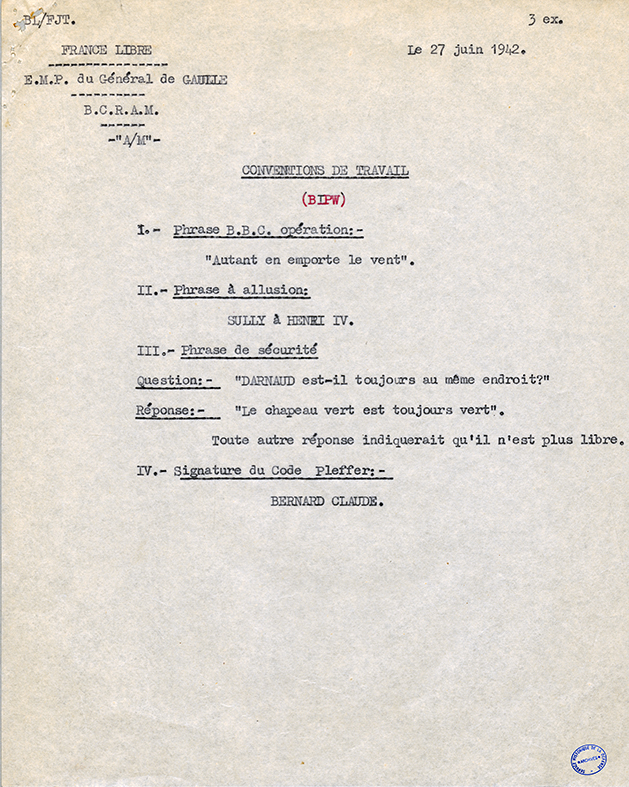Daniel Cordier: The green hat is still green
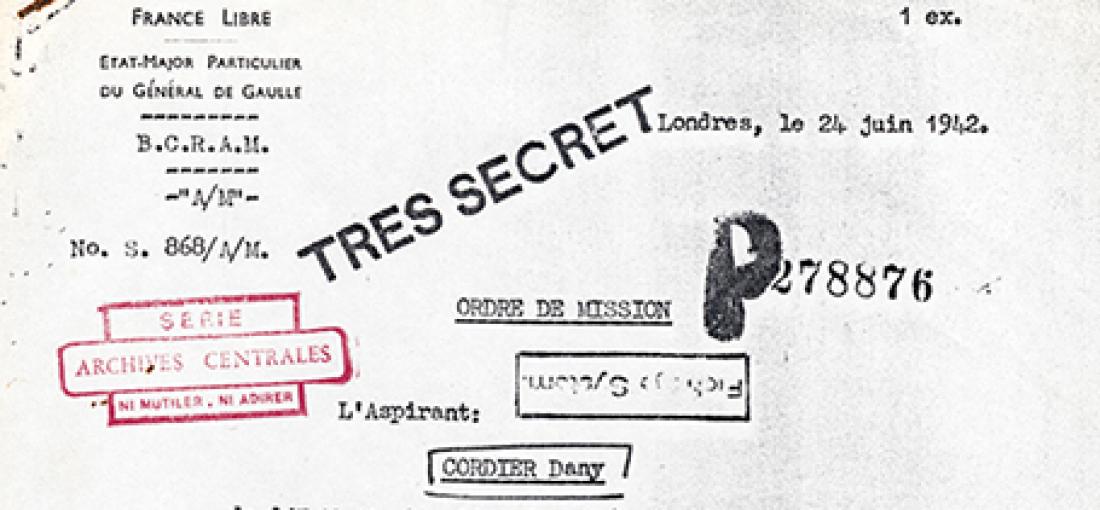
For a free Frenchman, joining the ranks of the Central Bureau of Intelligence and Operations meant giving priority to clandestine activities in France. The mission orders testify to the diversity of forms these activities took. The special services archives conserved by the Defence Historical Service still have their surprises, even for Daniel Cordier, who acquired a well-deserved reputation as a discoverer of the archives in the 1980s.
In the late 1970s, when he began his detailed research into the life and work of Jean Moulin, Daniel Cordier wanted to use documentary records rather than personal statements as far as possible. He himself had many documents, which he had kept since leaving the Direction générale des études et recherches (DGER, Directorate General of Studies and Research), where he had been responsible for sorting the archives and writing part of the Livre blanc (White Paper) of the Bureau central de renseignements et d'action (BCRA, Central Bureau of Intelligence and Operations). His status as Jean Moulin's former secretary and a Compagnon de la Libération (a recipient of the ”Companion of the Liberation” honour) also gave him privileged access to certain collections that were not accessible to other researchers, including the BCRA collection in the national archives. He also criss-crossed France in search of little-known archive repositories. In short, he was sure nothing could have escaped him. And yet… and yet, until very recently, Daniel Cordier did not know of his own mission order, of which no copies seem to have been conserved other than in the archives of the special services in Vincennes (see slideshow).
A pianist
This mission order, signed by General de Gaulle, was written on 24 June 1942 by Bruno Larat of the Operations/Missions (A/M) section of the BCRA, who would be arrested a year later at the same time as Jean Moulin and died as a deportee. As always, it is a very brief document, confirming the principle of a mission without going into detail: the aspiring agent Daniel Cordier was to be sent to the unoccupied zone as a radio operator - referred to at the time as ”pianists” (see Transmissions in service of action) - on behalf of the Commissariat national à l'intérieur (CNI, National Interior Commission).
The reader is immediately struck by the use of the name Cordier, imagining that mission orders in the secret services used a pseudonym adopted in London. In fact, that is the case: the young agent's real name at the time was that of his father, Bouyjou; Cordier was the name of his mother's second husband, Charles Cordier. As volunteers for Free France had the chance to choose a borrowed name for security reasons, Daniel Bouyjou seized the opportunity to fulfil a long-held dream and chose to adopt the much more common name of Cordier. His real name has been Daniel Bouyjou-Cordier since 1946.
The mission order is only the visible part of a much more comprehensive mission file presented by the BCRA to the chief of the private staff (EMP). This specifies that operator Cordier's mission, at the request of Jean Moulin, will be to carry out transmissions for the Information and Propaganda Bureau he had founded a few weeks previously in the southern zone to supply the Free French press with information from the resistance movements and vice versa. In reality, this was the Bureau d'information et de presse (BIP, Information and Press Bureau), led by Georges Bidault, himself codenamed Bip. Daniel Cordier thus became BipW, a codename combining the acronym BIP and the suffix W, used to designate radio operators. The training he had received in England included the skills needed to organise clandestine air operations on behalf of the Royal Air Force (RAF), such as having a Lysander aircraft land in an isolated field.
Daniel Cordier was finally dropped by parachute not far from Montluçon on the night of 25-26 July 1942 alongside two other BCRA agents. All three were met by another agent, Paul Schmidt, who had arrived a few weeks previously. Among the arrangements made before his departure is the phrase - ”The green hat is still green” - with which he was to respond if London asked him the question: ”Is Darnaud still at the same place?” Any other answer would mean that he was no longer free.
Orders and realities
A mission order was just the beginning of an adventure whose twists and turns could take the agent a long way from what was planned in the London offices. Daniel Cordier's case is a perfect example of this. As with many of his comrades in arms, the plan was for BipW to return to England ”in about three months” if he succeeded in training ”one or more radio operators”.
Such a deadline was never respected in reality. Daniel Cordier did not return fully to London until May 1944… But above all, the reality of his work in France had nothing to do with the wording of his mission order. This was due to Jean Moulin, who kept Cordier close by rather than assigning him to Bip and made him responsible for organising his secretarial work instead of carrying out transmissions to London. This is how Daniel Cordier came to act as the secretary of Jean Moulin, alias Rex, in the southern and then the northern zone… to the despair of the BCRA, which was very short of radio operators and did not understand how Rex had been able to divert an agent who had been trained for many months from his role.
Sébastien Albertelli
Teacher and doctor of history
FOR MORE INFORMATION
Daniel Cordier's mission order is conserved in the BCRA archives and will be classified in the sub-series GR 28 P 4 (network agent files).
His individual file as a resistance agent, conserved with the record number GR 16 P 85797, can be consulted in the reading room.
His oral statement (see From the BCRA archives to the White Paper), conserved under the number GR 3 K1 40, can be consulted freely.
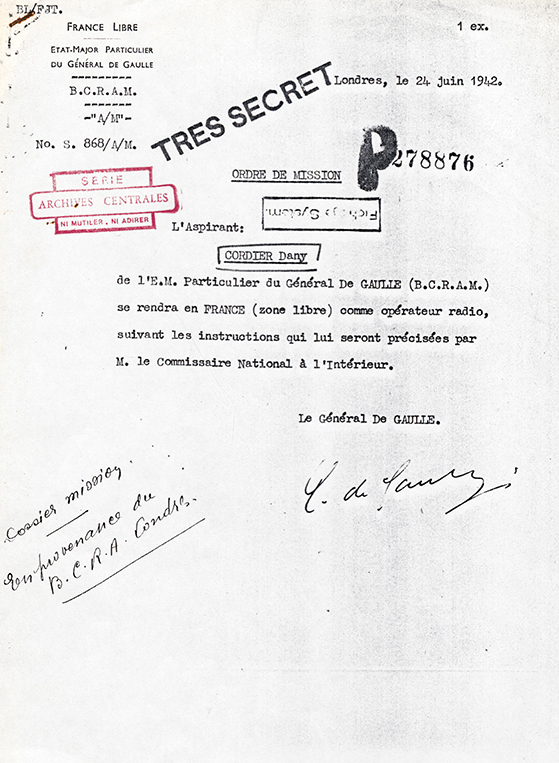
Ordre de mission de l'aspirant Daniel Cordier, 24 juin 1942.
© SHD
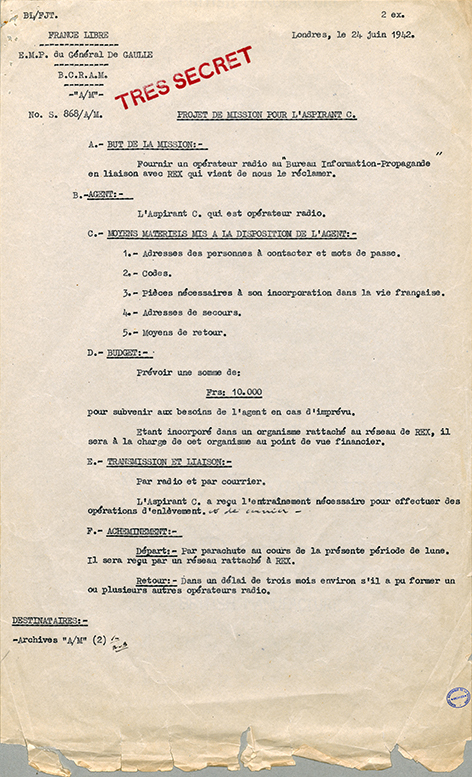
Ordre de mission de l'aspirant Daniel Cordier, 24 juin 1942.
© SHD
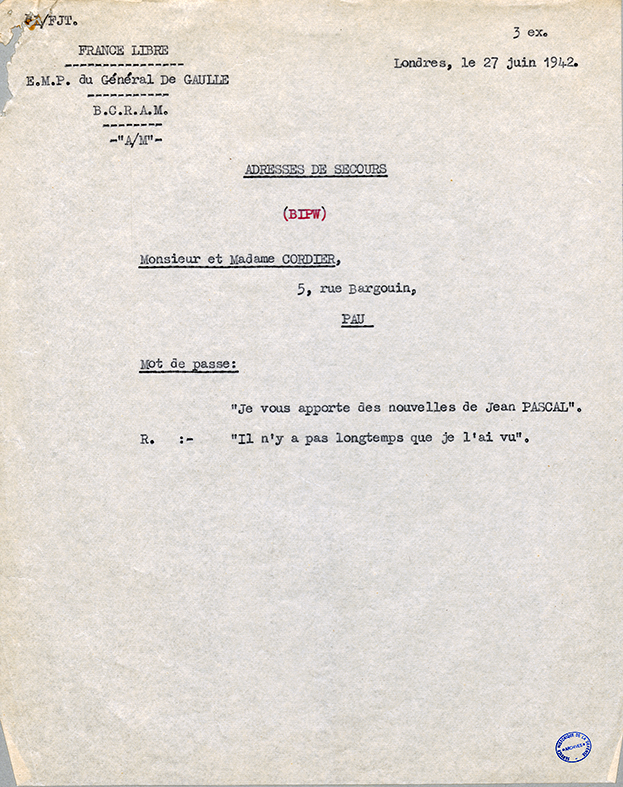
Ordre de mission de l'aspirant Daniel Cordier, 24 juin 1942.
© SHD
